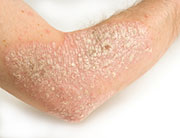Targeted therapies produce significant results, researchers say
THURSDAY, Oct. 1, 2015 (HealthDay News) — Two experimental drugs, brodalumab and secukinumab, show promise in treating psoriasis and psoriatic arthritis, according to two studies published in the Oct. 1 issue of the New England Journal of Medicine.
In one report, Mark Lebwohl, M.D., chairman of dermatology at the Icahn School of Medicine at Mount Sinai in New York City, and colleagues describe phase 3 brodalumab trials. Brodalumab is a monoclonal antibody designed to block the function of interleukin 17. The researchers randomly selected more than 3,000 patients with moderate to severe psoriasis to receive either brodalumab, ustekinumab, or placebo.
Forty-four percent of patients using brodalumab had 100 percent of their psoriasis cleared, compared with 22 percent of those receiving ustekinumab, Lebwohl told HealthDay. Moreover, more than 68 percent of patients receiving brodalumab saw 90 percent of their psoriasis clear, compared with 47 percent of patients receiving ustekinumab, he added. Side effects from brodalumab included mild to moderate yeast infections.
The other study involved 606 patients with psoriatic arthritis. Participants received either secukinumab or a placebo. The researchers found that 50 percent of the patients responded to treatment with secukinumab, compared with 17.3 percent of patients receiving placebo.
The first study was funded by Amgen, which co-developed brodalumab with AstraZeneca. The second study was funded Novartis, the manufacturer of secukinumab.
Full Text 1 (subscription or payment may be required)
Full Text 2 (subscription or payment may be required)
Copyright © 2015 HealthDay. All rights reserved.








